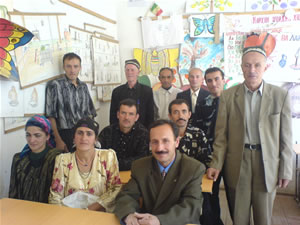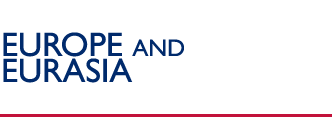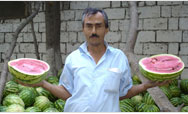 |
|
 |
 |
 |
USAID Information:
External Links:
|
|
 |
 |
|
 |
 |
|
School is a Beacon of Hope in Remote Tajikistan
“Let’s not stay there too long: it’s the den of the mujahedeen,” said the driver after we made the turn to Yazgulam Village, leaving behind the picturesque road along the river Pyanj in Gorno Badakhshan Oblast of Tajikistan.
As the car slowly advanced between two vast fields marked by yellow signs of a running figure with one leg torn off, signaling the risk of land mines, I began to appreciate his caution. Situated in a narrow valley among the rocky mountains of Pamir, Yazgulam was one of those places that had been considered an enemy enclave by government forces during the civil war. Even though the war ended years ago, vivid memories remain for most of Yazgulam’s inhabitants.
After a ninety-minute drive, we found ourselves in front of school #22, one of 18 core schools receiving assistance from USAID’s Improving Basic Education in Tajikistan (IBET) project implemented by the Aga Khan Foundation since 2003. Relatively large for a village school, school #22 has 279 students in grades 1-11 and 20 teachers. IBET has provided teacher and administrator training, books and teaching materials for establishing a Learning Resource Center, a small grant for classroom repairs, and helped increase skills in community mobilization and parent involvement. In return, the school agreed to serve as a resource and development hub for three satellite schools in the area through regular methodological support and mentoring. More than three years into the project, the school has transformed from a tolerated necessity for local kids into a buoyant community center with staff proud to be teachers.
The teachers say that education had not been a priority for this community prior to the USAID project. People were afraid of being forced to join the militants, of exposing their children to brainwashing by foreign Islamic extremists who used to wander around the village.
“We all lived behind closed doors, safety was the main concern. I didn’t have much hope that this place would ever get better”, says Khafiz Azoraev, a parent and chairman of the Parent-Teacher Association. “It’s completely different now.”
Step by step, through training and mentoring, both teachers and students came to appreciate the learning process and value their time spent in class. In turn, the school’s community outreach persuaded parents to become more involved in school life, changing attitudes from passive attendance of parental meetings to enthusiastic partnership aimed at quality improvement. Following the project’s advice, village established a non-budget fund, which accumulates community contributions to be used for school development needs.
During our visit, teachers gathered in a small room and spent an hour sharing their thoughts, ideas, and impressions of the project’s impact. The new methodologies promoted by the program taught these men and women to build student-centered lessons focusing attention on such new concepts as critical thinking, analysis, self-assessment, self-reflection, and teamwork. For many, it required a substantial personal effort to step away from traditional teaching toward modern methods which they had never witnessed before. Rearranging desks in clusters instead of rows, letting children talk while solving a problem, using visual teaching aids, handing out group assignments and making sure everyone stayed engaged – these were just a few of the changes that have taken place in their classrooms over the past three years.
While the project initially focused on primary school teachers, soon the entire faculty wanted to use the new techniques. As a result, three years after the USAID project began working with the school, children’s learning improved markedly and students were no longer repeating grades. Even more impressive, in 2005, graduates from school #22 entered universities – an historic first.
“Everything we have, everything we are proud of came with the support of the USAID project,” says the school director, Odinasho Mardov.
But without staff’s commitment and enthusiasm for changes, no investment or assistance would have ever resulted in any improvement. As Mardov leafed through the thick binders with the protocols of parent-teacher association meetings, the register of accounts for the school’s non-budget fund, and his most recent accomplishment – a Five-year School Development Strategy (the first to be designed in the entire district), with projections of future student flows, teaching and professional development needs, and various operational tasks, it was clear that the training he received in management and leadership could not have paid off better.
“They have offered me a job at the district administration three times over the past couple of years”, said the director, “but I can’t leave the school just as we are doing these great things. Our lives have been changed.”
As we prepared to leave, children poured through the front door and into the hallways and the teachers bid us good-bye. Before exiting the building, we made a small contribution to the non-budget fund, buying some dried fruits from the school’s canteen; it was registered promptly in the director’s books. The money will be used next year to get some new desks, chairs, and stationery for the Learning Resource Center.
Yazgulam school #22 is one of many schools in Tajikistan that badly need assistance and carefully use every dollar received from the American people through USAID to strive for excellence. These teachers and parents have survived a civil war, they have worked to overcome post-war fears and depression; helping them revive their schools and reclaim their security is an opportunity not to be underestimated.
 |
 |
| Teachers at Yazgulam School #22 say that they are proud of what they have been able to accomplish with the support of USAID |
Young pupils have responded to the introduction of modern teaching methods and materials, which are credited with widespread student success |
Back to Top ^ |


